Do you tend to bite your nails often? Do you have a habit of pulling your hair without even realizing it? Engaging in such repetitive behaviors that seem beyond your control can be a sign of body focused repetitive behaviors (BFRBs). So, are there any self-help tips for overcoming body focused repetitive behaviors?
Yes. Most of us frequently pick at our skin, pull our hair, bite our nails without being aware of it. While such habits can seem harmless at a glance, when it becomes uncontrollable and left unaddressed, body focused repetitive behaviors can seriously affect our mental health and quality of life.
Although such behaviors can be challenging and distressing, there are ways to overcome it. Let’s explore this complex and often misunderstood phenomenon, exploring what are body focused repetitive behaviors, its roots, impacts, and the journey to understanding and healing.
What are Body Focused Repetitive Behaviors?
Body-focused repetitive behaviors, often referred to as BFRBs, are a group of self-grooming behaviors that involve recurrent, excessive, and often uncontrollable actions targeting one’s own body.
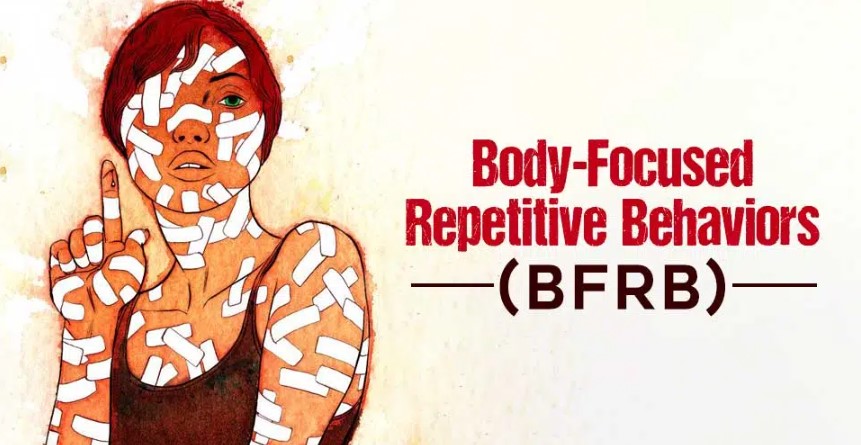
Researchers define BFRB as an umbrella term used to describe “undesirable, repetitive motor activities that may result in functional impairment. They are engaged in to eliminate a part of the body and may result in impaired functionality.” It can include behaviors like –
- Hair pulling disorder or Trichotillomania (TTM)
- Skin picking disorder (SPD) or Excoriation disorder
- Nail biting or Onychophagia
- Cheek chewing
- Lip biting
- Finger sucking
- Finger cracking
- Teeth grinding
These behaviors serve as coping mechanisms for individuals and are often triggered by stress, anxiety, boredom, tension or other emotional triggers. Studies have found that sufferers tend to “experience temporary relief once the behavior is performed.”
BFRBs are typically considered to be “nonfunctional self-injurious behaviors” and are categorized as obsessive-compulsive and related disorders (OCRDs). It often co-occurs with anxiety disorders.
Now that we know what are body focused repetitive behaviors, let’s take a look at the signs and causes so that we can delve deeper into the strategies for overcoming body focused repetitive behaviors.
Related: Can’t Stop Playing With Your Hair? You Might Have Hand In Hair Syndrome (6 Ways To Treat It)
Signs of BFRBs You Must Know About
Identifying the signs of BFRBs is crucial for recognizing and addressing these behaviors. Here are some common signs to look out for:
1. Hair Pulling (Trichotillomania)
- Frequent pulling of hair from the scalp, eyebrows, or other body parts.
- Visible thinning or bald patches.
- Feelings of tension or relief during and after hair pulling.
2. Skin Picking (Excoriation Disorder)
- Repetitive picking of the skin, resulting in wounds, scabs, or scars.
- Spending excessive time examining and picking at perceived skin imperfections.
- Significant distress or impairment in daily functioning due to the behavior.
3. Nail Biting (Onychophagia)
- Persistent biting or chewing of nails, cuticles, or surrounding skin.
- Nails appearing jagged, uneven, or damaged.
- Infections or pain in the fingertips due to excessive biting.
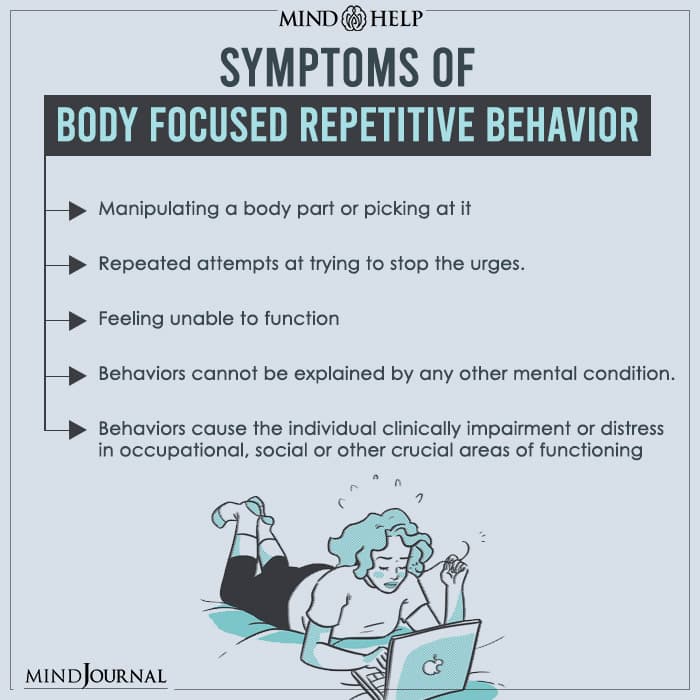
What Causes Body Focused Repetitive Behaviors?
The exact causes of BFRBs are not fully understood, but a combination of genetic, environmental, and psychological factors are believed to contribute to their development. Here are some potential causes:
1. Genetic Predisposition
BFRBs tend to run in families, suggesting a genetic component. Certain gene variants may increase the likelihood of developing these behaviors.
Researchers have found that such behaviors are “part of an evolutionary process as a genetic remnant of grooming.” Such grooming behaviors often have a pleasant/rewarding aspect.
2. Neurological Factors
Imbalances in neurotransmitters, such as serotonin and dopamine, may play a role.
Changes in brain structures and functions related to impulse control and emotional regulation.
Related: 5 Psychological Reasons Behind Nail Biting
3. Emotional Triggers
Stress, anxiety, boredom, or frustration can trigger BFRBs as a way to cope or seek relief. BFRBs may serve as a means to regulate emotions or provide a sense of control. This is what causes body focused repetitive behavior.
One 2015 study found that “BFRBs are triggered by negative emotions and reinforced by alleviation of unpleasant affect.” It also suggests that such behaviors are triggered by and alleviate boredom, impatience, dissatisfaction and frustration.
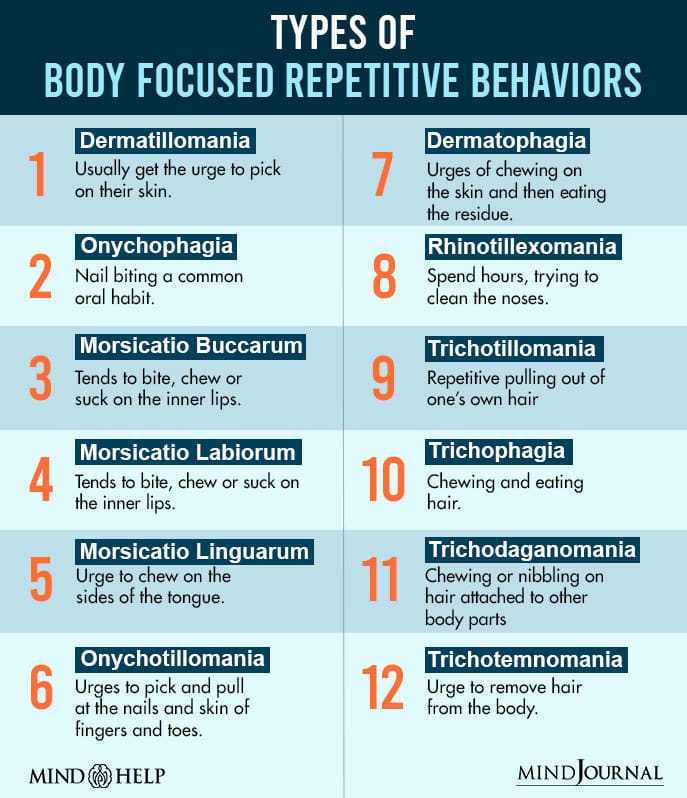
Tips for Overcoming Body Focused Repetitive Behaviors
While overcoming BFRBs can be challenging, it is not impossible. Here are some practical tips to help you take control of these behaviors and embark on a journey to self-healing:
1. Increase Self-Awareness
Pay attention to your triggers and identify the situations or emotions that lead to BFRBs.
Keep a journal to track your behaviors, noting the circumstances surrounding each episode.
2. Seek Professional Help
Consult a mental health professional experienced in treating BFRBs and seek therapy. Cognitive-behavioral therapy (CBT) and Habit reversal training (HRT) are effective therapeutic approaches.
3. Develop Healthy Coping Strategies
Find alternative ways to manage stress and emotions, such as deep breathing, meditation, or exercise. Engage in hobbies or activities that keep your hands occupied and divert your attention away from BFRBs.
4. Modify Your Environment
Remove or modify triggers in your environment that promote BFRBs, such as tweezers, mirrors, or sharp objects. Create a supportive environment by seeking understanding and support from family and friends.
5. Practice Self-Care
Prioritize self-care activities that promote relaxation and reduce anxiety, such as taking baths, practicing mindfulness, or getting enough sleep. Loving and taking care of yourself is one of the most important tips for overcoming body focused repetitive behaviors.
6. Utilize Behavioral Techniques
Utilize techniques like habit reversal training (HRT) to replace BFRBs with more positive behaviors. Use positive reinforcement and rewards to motivate yourself during the process.
7. Consider Support Groups
Joining support groups or online communities can provide a sense of belonging and understanding. Interacting with others who share similar experiences can offer valuable insights and encouragement.
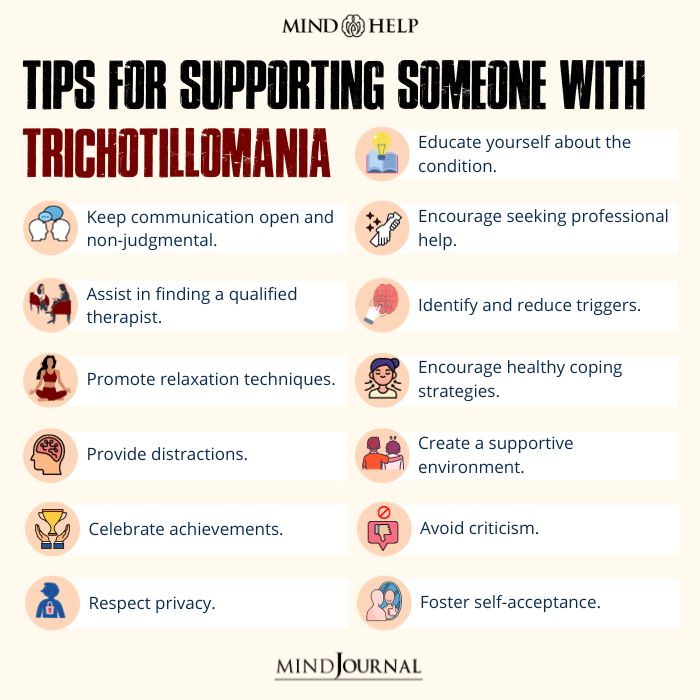
8. Patience and Persistence
Overcoming BFRBs is a gradual process that requires patience and self-compassion.
Celebrate small victories along the way and remain persistent in your efforts.
Related: 10 Signs Your Mental Health Is Finally Improving
Takeaway
Body-focused repetitive behaviors can be distressing and challenging to overcome, but with the right strategies and support, it is possible to regain control over these behaviors and lead a fulfilling life.
Remember, you are not alone in this journey, and seeking help from professionals and connecting with others who share similar experiences can provide immense support and encouragement.
By following the above tips on overcoming body focused repetitive behaviors, you can gradually overcome body-focused repetitive behaviors and embark on a path towards self-healing. Be kind to yourself throughout this process, celebrate your progress, and remember that overcoming BFRBs is a testament to your strength and resilience.
You deserve to live a life free from the constraints of these behaviors, and with determination and support, you can overcome them and embrace a healthier, more empowered version of yourself.
Frequently Asked Questions (FAQs):
Is BFRB an anxiety disorder?
BFRB is not solely an anxiety disorder, but it often coexists with anxiety and other mental health conditions.
Is BFRB ADHD or OCD?
While BFRB shares similarities with ADHD and OCD, it’s a distinct condition that may overlap with these disorders.
What is a repetitive habit a symptom of?
Repetitive habits can be symptoms of various conditions, including anxiety disorders, OCD, ADHD, or BFRBs like trichotillomania and dermatillomania.
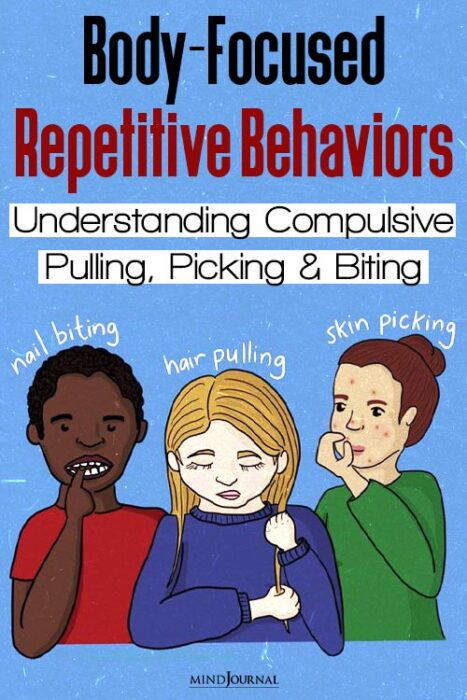






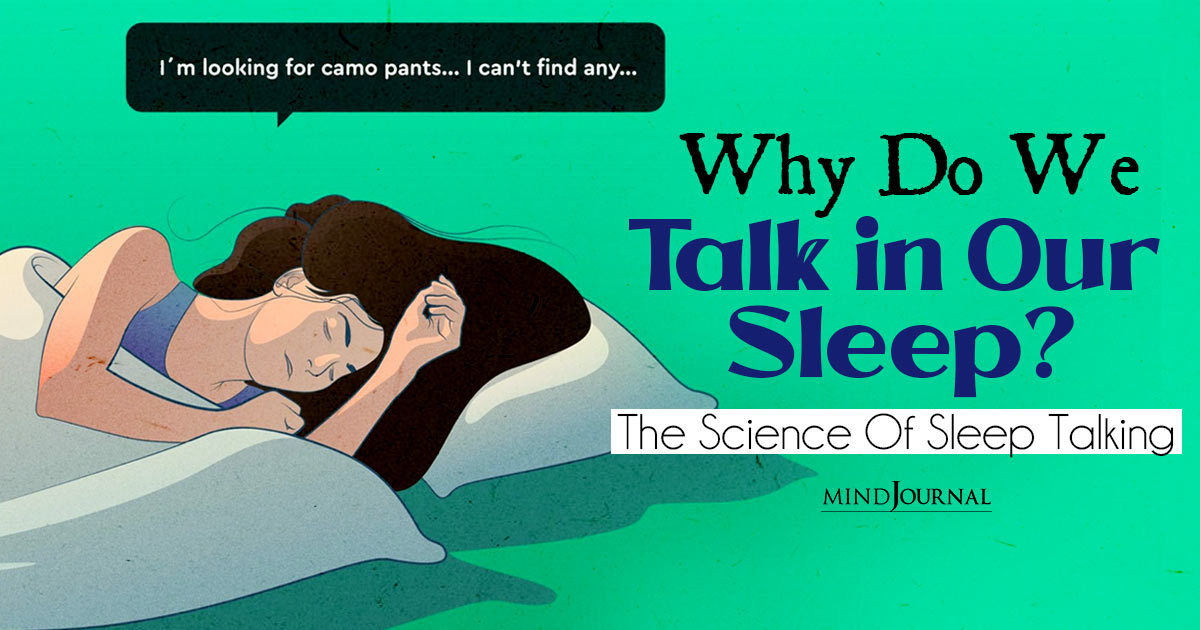

Leave a Reply
You must be logged in to post a comment.